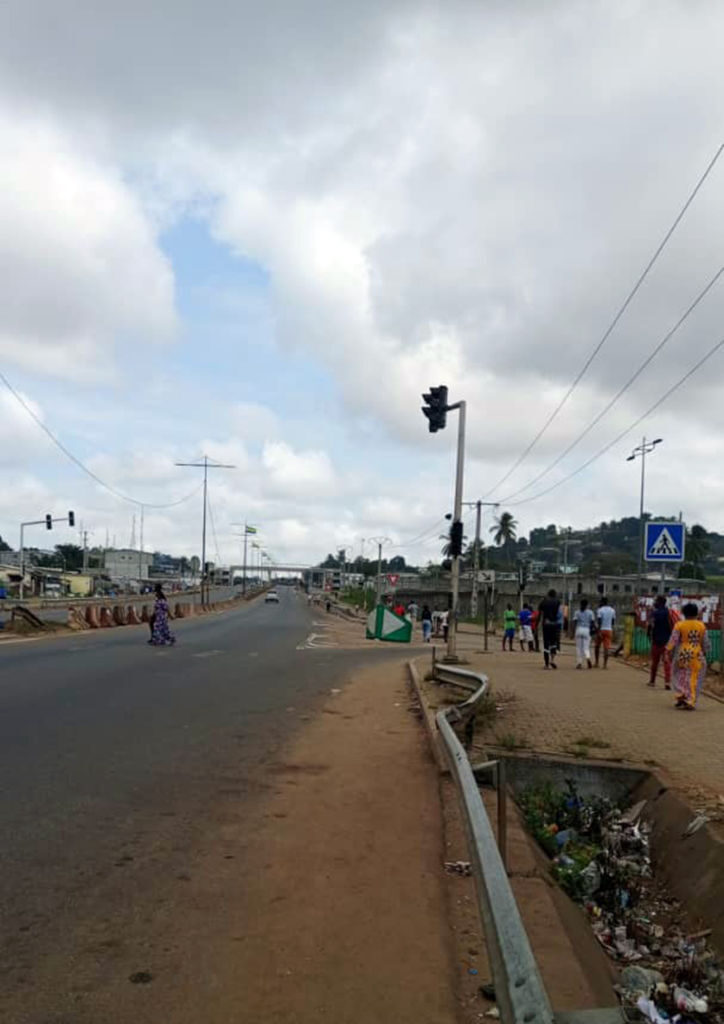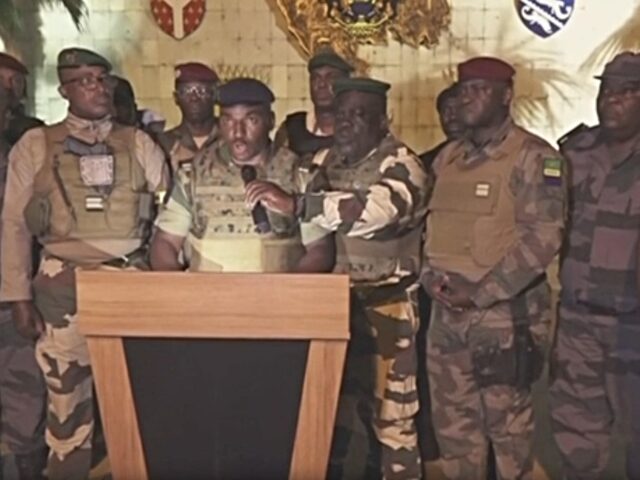Top military officials in Gabon, central Africa, appeared suddenly on national television on Wednesday and announced they had ended the regime of President Ali Bongo Ondimba, whose family has ruled the country since 1967.
The soldiers, identifying themselves as “The Committee of Transition and the Restoration of Institutions,” condemned Bongo for holding what they deemed a fraudulent election on August 26 and claimed they were compelled to address Gabon’s “serious institutional, political, economic, and social crisis” by placing Bongo under house arrest and putting the nation “on the road to happiness.”
“Added to this is irresponsible and unpredictable governance, resulting in a continuing deterioration in social cohesion, with the risk of leading the country into chaos,” the soldiers said in their televised statement, according to a translation from the original French published by Nigeria’s Daily Trust. “Today, 30 August 2023, we … on behalf of the people of Gabon and as guarantors of the institutions’ protection — have decided to defend peace by putting an end to the current regime.”
“All the institutions of the Republic are dissolved: the government, the Senate, the National Assembly, the Constitutional Court, the Economic, Social and Environmental Council and the Gabonese Elections Centre,” the statement continued. “We call for calm and serenity from the public, the communities of sister countries settled in Gabon, and the Gabonese diaspora. We reaffirm our commitment to respecting Gabon’s commitments to the national and international community.”
“People of Gabon, we are finally on the road to happiness,” the soldiers promised.
The statement did not offer any clarity on who the new president of the country would be or whether the coup organizers would soon hold free and fair elections.
The military restored public access to the internet on Wednesday, which Bongo had cut prior to the election this weekend. Bongo allegedly “won” Sunday’s election, according to the Gabonese Election Center, with 64.27 percent of the vote. The announcement of his “victory” immediately preceded the televised coup declaration.
In addition to shutting down the internet, Bongo banned broadcasts of French news outlets France 24, Radio France Internationale, and TV5 Monde, claiming they suffered from a “lack of objectivity.” The move garnered international condemnation.
“Gabonese authorities must lift the suspensions of France 24, Radio France Internationale, and TV5 Monde and ensure people throughout the country can freely access the internet,” a senior official with the Committee to Protect Journalists demanded on Monday. “Local and international media, as well as internet access, play a fundamental role in election transparency, and the public must be able to receive and share the information they need to make informed decisions.”
Gabon is facing the eighth such coup d’etat in Africa since 2020. If the “Committee of Transition and the Restoration of Institutions” manages to retain control of the country, it would join Burkina Faso, Mali, Guinea, and Niger in being governed by a military junta. Niger’s coup, occurring in late July, is the most recent, and its democratically elected President Mohamed Bazoum remains under house arrest at the present time.
Bongo is also under house arrest. Unlike Bazoum, who has managed only to publish written statements from the presidential palace, Bongo appeared in a video on Wednesday evening local time confirming his health, but stating that he did not know where his family was or if they were safe.
“I’m to [sic] send a message to all the friends that we have all over the world to tell them to make noise, to make noise,” Bongo said in English. “For the people here have arrested me and my family. My son is somewhere, my wife is in another place, and I’m at the residence right now. I am at the residence and nothing is happening.”
“I don’t know what’s going on,” he added.
Al Jazeera documented gunshots throughout the nation’s capital, Libreville, following the announcement of the coup. Footage from the capital showed crowds of soldiers taking the streets, apparently in celebration.
Gabon coup…
General Brice Oligui Nguema, head of the presidential guard of ousted President Ali Bongo Ondimba, is carried in triumph by hundreds of soldiers a few hours after a coup, to the cries of "Oligui president" #NTVNews
📸 : GABON 24 / AFP pic.twitter.com/K5SJoMYxMQ
— NTV UGANDA (@ntvuganda) August 30, 2023
Bongo is the son of Omar Bongo, the leader of the dominant Gabonese Democratic Party (PDG). Omar Bongo was the dictator of the country from 1967 to his death in 2009, handing over power to his son. Before 1990, Omar Bongo made it illegal for other political parties to exist.
Decades into PDG rule, the Bongo family amended constitutional law to perpetuate itself in power.
“First, term limits were removed from the constitution in 2003, ensuring that Bongo could serve as president for life,” the African outlet The Conversation detailed prior to this weekend’s election. “Second, traditional two-round ballots were changed into single-round ballots, also in 2003. This was to ensure that Bongo’s opponents could not rally around a single challenger in a run-off.”
“Third, instead of requiring that the winner obtain a majority, all that is needed for Bongo to be re-elected is a plurality. This means a majority could be less than 50%, as long as the winner has the most votes,” the Conversation detailed. “Had he been required to win a majority of votes, Ali Bongo, with 49.8% in the 2016 election, would not be president today.”

A general view of the street after Gabonese army officers announced that they had seized power in Libreville, Gabon on August 30, 2023. (Stringer/Anadolu Agency via Getty Images)
The U.S. State Department, in its 2022 international human rights report, accused Bongo of a long list of human rights abuses including:
torture and cases of cruel, inhuman, or degrading treatment by the government; harsh and life-threatening prison conditions; serious problems with the independence of the judiciary; political prisoners or detainees; arbitrary or unlawful interference with privacy; serious restrictions on free expression and media due to censorship and the enforcement of criminal libel laws to limit expression; inability of citizens to change their government peacefully through free and fair elections; serious government corruption; and existence of the worst forms of child labor.
Bongo is a close ally of the Chinese Communist Party’s, signing Gabon up for Beijing’s predatory Belt and Road Initiative (BRI) and most recently visiting Beijing in April. Under Bongo’s rule, China became Gabon’s largest trade partner; Bongo visited China 11 times during his presidency. Bongo was the first African leader to visit China in 2023.
The Chinese Communist Party responded to the coup on Wednesday with alarm.
“We call on all sides in Gabon to proceed from the basic interests of the country and the people, resolve differences through dialogue, (and) restore normal order as soon as possible,” Foreign Ministry spokesman Wang Wenbin told reporters, demanding the military junta “guarantee the personal safety of President Bongo, and uphold national peace and stability.”

COMMENTS
Please let us know if you're having issues with commenting.